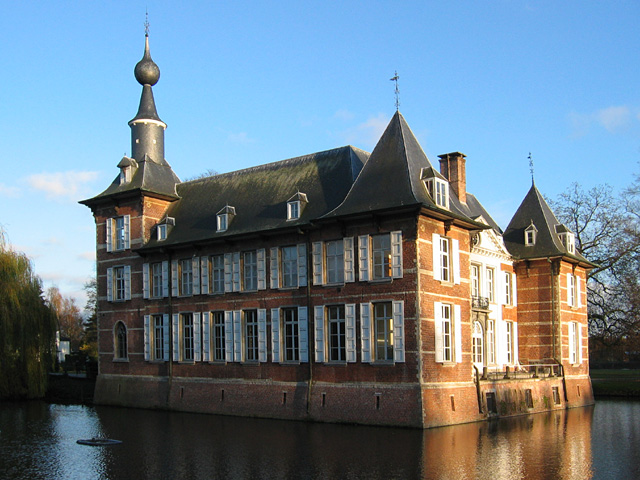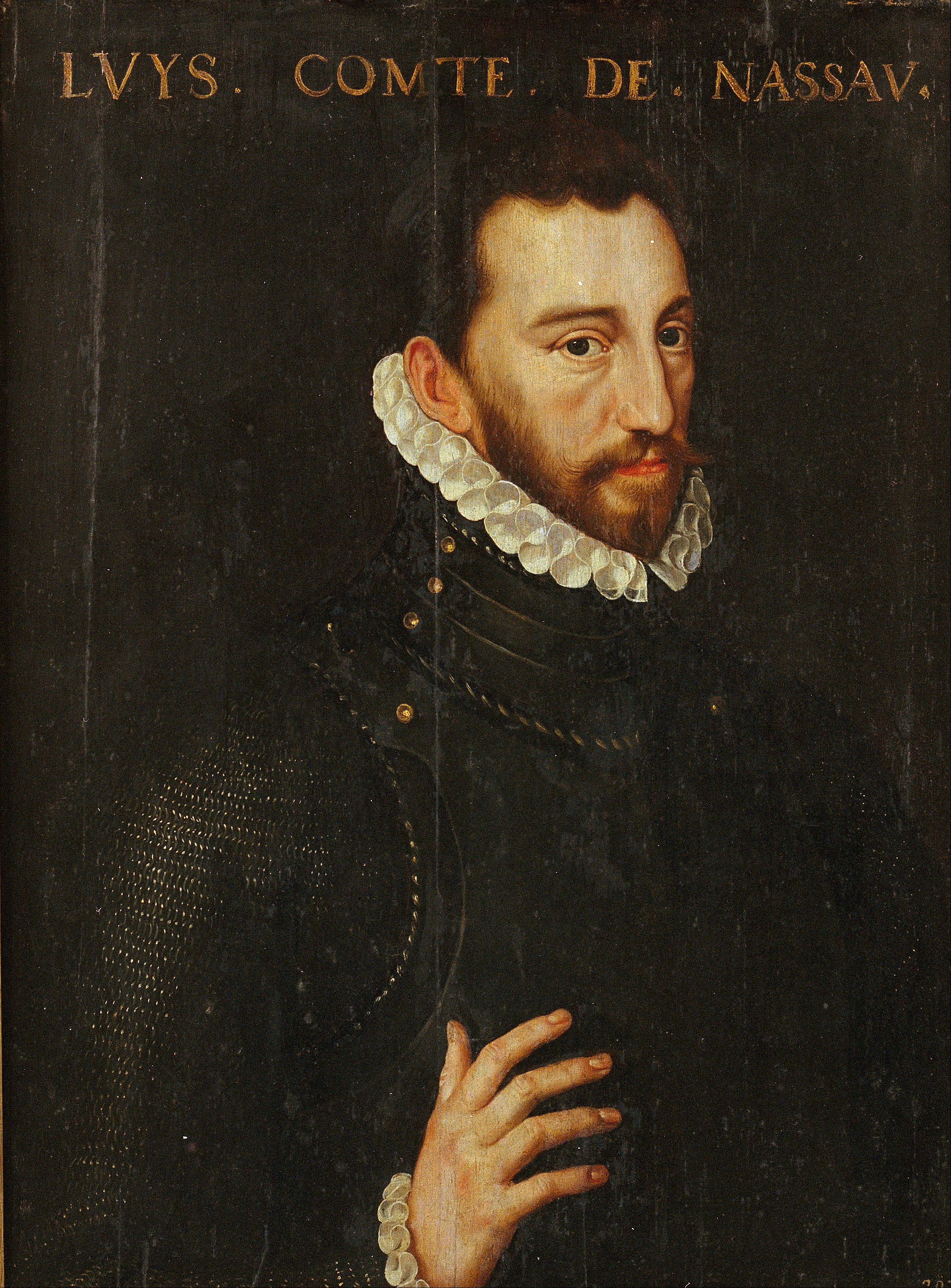|
Lancelot Van Brederode (died 1573)
Lancelot van Brederode (died 20 July 1573, Schoten) was a Dutch general in the Dutch Revolt. He was vice admiral of the 'geuzen' or 'Sea Beggars' and a captain in the army of Louis of Nassau. He is not to be confused with another Lancelot van Brederode (c.1583–1668), associate of Frans Kuyper. Life An illegitimate son of Reinoud III van Brederode by Anna Simonsdochter, his year of birth is unknown. He led the resistance at the Siege of Haarlem but when the city fell the Spanish beheaded him and demolished the van Brederode castle. His half-brother Hendrick van Brederode Henry (Hendrik), Lord of Bréderode (December 1531 – 15 February 1568) was a member of the Dutch noble family Van Brederode and an important member during the Eighty Years' War. He was named the "Grote Geus" or the "big beggar". Biography ... was also a general in the revolt. External links Lancelot van Brederode - 'Eén van de schoonste verzetsstrijders' Dutch people of the Eighty Years' War (Un ... [...More Info...] [...Related Items...] OR: [Wikipedia] [Google] [Baidu] |
Schoten
Schoten () is a municipality located in Antwerp Province, Belgium. The municipality only comprises the town of Schoten proper. As of 1 January 2020 Schoten has a total population of 34,311. The total area is which gives a population density of . Schoten borders the Antwerp districts Merksem to the west and Deurne to the south west. Neighboring municipalities include Brasschaat to the north, Brecht to the north east, Schilde to the east, and Wijnegem to the south. History Early Middle Ages The history and usage of the name Schoten may have come from the name given to the wooden dividing walls (''schot'' in Dutch) that were driven in the ground to separate private property. The Christianization of the area dates from the end of the 7th century, under the influence of Abbot Ursmarus, of Lobbes Abbey, which owned property here. In the 12th century, the territory was under the political authority of the lords of Breda, then of the lords of Bergen-op-Zoom. Religiously, it was ... [...More Info...] [...Related Items...] OR: [Wikipedia] [Google] [Baidu] |
Dutch Revolt
The Eighty Years' War or Dutch Revolt ( nl, Nederlandse Opstand) (Historiography of the Eighty Years' War#Name and periodisation, c.1566/1568–1648) was an armed conflict in the Habsburg Netherlands between disparate groups of rebels and the Spanish Empire, Spanish government. The Origins of the Eighty Years' War, causes of the war included the Reformation, centralisation, taxation, and the rights and privileges of the nobility and cities. After Eighty Years' War, 1566–1572, the initial stages, Philip II of Spain, the sovereign of the Netherlands, deployed Army of Flanders, his armies and Eighty Years' War, 1572–1576, regained control over most of the rebel-held territories. However, Spanish Fury, widespread mutinies in the Spanish army caused a general uprising. Under the leadership of the exiled William the Silent, the Catholic- and Protestant-dominated provinces sought to establish religious peace while jointly opposing the king's regime with the Pacification of Ghent ... [...More Info...] [...Related Items...] OR: [Wikipedia] [Google] [Baidu] |
Louis Of Nassau
Louis of Nassau (Dutch: Lodewijk van Nassau, January 10, 1538 – April 14, 1574) was the third son of William I, Count of Nassau-Siegen and Juliana of Stolberg, and the younger brother of Prince William of Orange Nassau. Louis was a key figure in the revolt of the Netherlands against Spain and a strongly convinced Calvinist, unlike his brother William, whom he helped in various ways, including by arranging the marriage between him and his second wife Anna of Saxony. In 1569 William appointed him governor of the principality of Orange, giving him an indisputable position in French politics. The Compromise In 1566 he was one of the leaders of the league of lesser nobles who signed the "Compromis des Nobles". The Compromise was an open letter, in the form of a petition, to King Philip II of Spain stating that he should withdraw the Inquisition in the Netherlands. On April 5, 1566, with the following of two hundred horsemen, the Compromise was presented to the regent Marg ... [...More Info...] [...Related Items...] OR: [Wikipedia] [Google] [Baidu] |
Reinoud III Van Brederode
Reinoud III van Brederode (4 September 1492, Brederode Castle, Santpoort – 25 September 1556, in Brussels), lord of Brederode and Vianen, burgrave of Utrecht, master of the woods and master of the hunt of Holland, member of the Council of State. Reinoud III was the father of Hendrik van Brederode. He was also member of the privy council and chamberlain to Charles V, Holy Roman Emperor. From 1531 on he resided in Castle Batensteinwww.collectieutrecht.nl ''Cornelis Antonisz (follower), Portrait of Reinoud III van Brederode, ca. 1550'' He was the son of Walraven II van Brederode and Margaretha van Borselen. As a knight of the |
Siege Of Haarlem
The siege of Haarlem was an episode of the Eighty Years' War. From 11 December 1572 to 13 July 1573 an army of Philip II of Spain laid bloody siege to the city of Haarlem in the Netherlands, whose loyalties had begun wavering during the previous summer. After the naval battle of Haarlemmermeer and the defeat of a land relief force, the starving city surrendered and the garrison was massacred. The resistance nonetheless was taken as an heroic example by the Orangists at the sieges of Alkmaar and Leiden. Prelude The city of Haarlem initially held a moderate view in the religious war that was going on in the Netherlands. It managed to escape from the Reformed iconoclasm in 1566 that affected other cities in the Netherlands. When the city of Brielle was conquered by the Geuzen revolutionary army on 1 April, Haarlem did not initially support the Geuzen. Most city administrators—unlike many citizens—did not favor open revolution against Philip II of Spain, who had inh ... [...More Info...] [...Related Items...] OR: [Wikipedia] [Google] [Baidu] |
Van Brederode
The Lords of Van Brederode (''Heeren van Brederode'') were a noble family from Holland who played an important role during the Middle Ages and the Early modern period. The family had a high noble rank and hold the titles ''Count of Brederode'', Count of Gennep, and furthermore they ruled the souverain Lordship of Vianen, the Viscountship of Utrecht among other feudal titles. History The Lords of Brederode descendant from the Counts of Holland and the powerful Van Teylingen family (see Slot Teylingen, about halfway between Haarlem and Leiden). Dirk I van Brederode, also called ''Dirk van Teylingen'', built the Brederode castle. The earliest documented members appear in the 13th century in the region of Santpoort, at Castle Brederode. The lords of Brederode already had enormous influence in the 13th century. Their partisanship with John of Avesnes, Count of Holland was not without importance, but it increased when the dispute between the Hoeks and the Cods broke out in 1350. Th ... [...More Info...] [...Related Items...] OR: [Wikipedia] [Google] [Baidu] |
Hendrick Van Brederode
Henry (Hendrik), Lord of Bréderode (December 1531 – 15 February 1568) was a member of the Dutch noble family Van Brederode and an important member during the Eighty Years' War. He was named the "Grote Geus" or the "big beggar". Biography Hendrik van Brederode was born at Brussels. He became a convert to the Reformed faith and placed himself at the side of the prince of Orange and Count of Egmont in resisting the introduction of the Spanish Inquisition and Spanish despotism into the Netherlands. In 1566 he was one of the founders of the confederacy of nobles who bound themselves to maintain the rights and liberties of the country by signing a document known as the Compromise of Nobles. On 5 April that year Brederode accompanied to the palace a body of 300 Knights, for whom he acted as the spokesman, to present to the regent, Margaret of Parma, a petition setting forth their grievances. It was at a banquet at the Hotel Culemburg on 8 April, presided over by Bréderode, that ... [...More Info...] [...Related Items...] OR: [Wikipedia] [Google] [Baidu] |
Dutch People Of The Eighty Years' War (United Provinces)
Dutch commonly refers to: * Something of, from, or related to the Netherlands * Dutch people () * Dutch language () Dutch may also refer to: Places * Dutch, West Virginia, a community in the United States * Pennsylvania Dutch Country People Ethnic groups * Germanic peoples, the original meaning of the term ''Dutch'' in English ** Pennsylvania Dutch, a group of early Germanic immigrants to Pennsylvania *Dutch people, the Germanic group native to the Netherlands Specific people * Dutch (nickname), a list of people * Johnny Dutch (born 1989), American hurdler * Dutch Schultz (1902–1935), American mobster born Arthur Simon Flegenheimer * Dutch Mantel, ring name of American retired professional wrestler Wayne Maurice Keown (born 1949) * Dutch Savage, ring name of professional wrestler and promoter Frank Stewart (1935–2013) Arts, entertainment, and media Fictional characters * Dutch (''Black Lagoon''), an African-American character from the Japanese manga and anime ''Black L ... [...More Info...] [...Related Items...] OR: [Wikipedia] [Google] [Baidu] |

.jpg)
